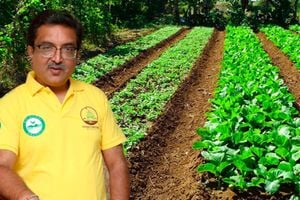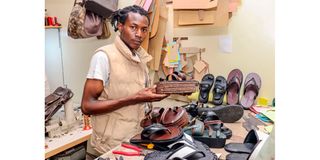
George Otieno pictured at his workshop in Kibera, Nairobi on November 13, 2024. He Crafts leather sandals using premium leather and traditional akala techniques for a unique touch.
As the world grapples with waste management issues, discarded car tyres contribute to pollution and fill up landfills. George Otieno, founder of Akala 21, is tackling this problem by turning these tyres into stylish and durable footwear.
His innovative approach helps reduce landfill waste and supports environmental conservation, proving that fashion can be both modern and eco-friendly for today's conscientious shoppers. A certified fashion designer, he has loved Akala sandals since childhood.
“I was captivated by their diverse designs and trendy styles. I appreciated their aesthetic appeal, sustainability, and durability. One could easily visit a Jua Kali artisan's workshop to get custom-made sandals crafted from recycled tyres within minutes,” he says.
These early experiences left a lasting impression on him and cultivated his passion for footwear, particularly sandals, made from recycled materials.
He recognised an opportunity to empower the Jua Kali footwear sector by introducing advanced skills, organisation, and teamwork, transforming it into a more professional endeavour while continuing to share authentic Kenyan and African stories through their creations.
“Akala 21 stemmed from a keen awareness of the waste crisis caused by discarded tyres. I aim to redefine fashion by turning this waste into wearable art, demonstrating that style and sustainability can coexist. Our designs are deeply influenced by African culture and sustainability, telling authentic stories while addressing environmental challenges,” he says.
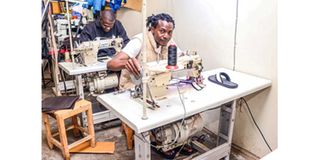
George Otieno pictured at his workshop in Kibera, Nairobi on November 13, 2024. He Crafts leather sandals using premium leather and traditional akala techniques for a unique touch.
Profitable gaps
He identified a gap in the fashion industry for sustainable products that maintain style and quality. His research revealed that, despite growing consumer interest in sustainability, few options successfully blended eco-friendliness with trendy designs.
It was this understanding that motivated him to launch Akala 21 to fill this void and create a brand that would resonate with environmentally conscious consumers.
"Establishing the brand required meticulous financial planning and strategic resource allocation. The initial capital investment of Sh8,500 came from family contributions and was crucial for covering expenses related to material sourcing, production, marketing, and operational activities," he explains.
In managing funds, he focused on key areas of the business, balancing growth by allocating resources to both production and marketing. However, unexpected costs arose during the start-up phase, particularly in sourcing materials and developing prototypes.
To overcome these challenges, the team remained flexible and adjusted their strategies to alleviate financial pressures.
Nostalgic
The name 'Akala 21' is significant as it connects to Kenyan heritage and recalls the age-old practice of making shoes from worn tyres. The '21' represents a modern take on traditional Akala sandals for 21st-century consumers. This name combines traditional craftsmanship with contemporary design, bridging the past and present.
The upcycling process begins with the sourcing of unusable tyres, which are cleaned, cut and transformed into stylish footwear and accessories, providing an eco-friendly solution to waste management and resulting in unique designs.
The brand works with local artisans to promote fair labour practices and support local economies, ensuring quality craftsmanship and improving the livelihoods of the artisans involved.
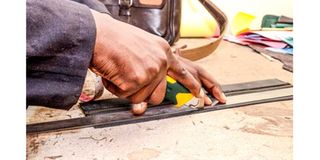
Leather used to make sandals cut at George Otieno’s workshop in Kibera, Nairobi on November 13, 2024.
In addition to upcycling tyres, the design team sources leather from various tanneries in Kenya and beyond, creating technical drawings and 3D renderings before developing patterns for sampling. Once a sample is approved, the production team evaluates each product for aesthetics, durability and environmental impact.
To maintain sustainable practices, Akala 21 uses in-line quality control to minimise waste and ensure high quality finishes, saving time and resources and reducing the likelihood of product rejection.
“Once the designs are finalised, prototypes are created to allow for adjustments based on practicality and style,” he says. After rigorous testing, the products go into production, where local artisans bring the designs to life. The brand also works with sustainability stakeholders to upcycle raw materials.
The finished products undergo a final inspection before being packaged for delivery, with designated riders and courier services used for shipping.
“Upcycled tyre is very durable since 70 percent of its component is pure rubber,” he adds. By pairing these upcycled soles with high-quality genuine leather for the sandal straps and foot beds, the brand ensures durability and comfort, thereby reducing the need for frequent replacements.
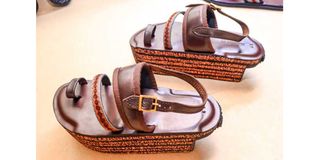
Handcrafted leather sandals made with genuine leather and akala pictured at George Otieno’s workshop in Kibera, Nairobi on November 13, 2024.
The brand engages with its audience through a variety of channels, including social media, local events and collaborations with influencers who share a passion for sustainable fashion.
Perfect balance
Akala 21 expertly balances sustainability with style, ensuring that each product looks good and has a minimal environmental footprint. The brand focuses on innovative design features that set its footwear and accessories apart, such as vibrant colours, unique textures and comfortable fits.
Mr Otieno faced challenges in sourcing quality leather due to his limited knowledge. His lack of expertise made him vulnerable to buying inferior materials without the guidance of a professional leathersmith.
In addition, a key challenge when working with upcycled tyres is sourcing materials of consistent quality and condition. Their considerable variability can affect the final product if not carefully checked.
Since its inception, Akala 21 has sold over 700 products, ranging in price from Sh3,000 to Sh8,000.
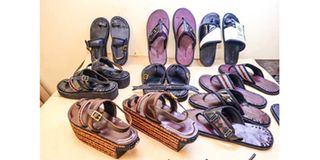
The leather is sourced from various tanneries in Kenya.
“Our premium packages include services such as made-to-measure fittings, foot evaluations, personalised selection of materials, custom-made sandals for weddings and events, and tailored wardrobe collections,” he states.
Akala 21 employs up to 10 artisans and has ambitious plans for local and international expansion, introducing new product lines and partnering with like-minded retailers.
Central to this growth strategy is the empowerment of over 100 artisans. The brand is also focused on enhancing its production capabilities by acquiring specialised machinery and modernising its methods, while maintaining its authentic traditional African touch.
“We have begun exploring various suppliers, with our first destination being Ethiopia this November, where we will showcase our incredible materials and handmade sandals. We also plan to meet prospective suppliers of high-quality Ethiopian leather and accessories for our craft,” he says.
Impact
Akala 21 is focused on making a positive impact on the local community by supporting artisans in the production process. The brand ensures fair wages and offers skill development opportunities, promoting empowerment and creativity among local artisans.
This commitment helps artisans to improve their skills and meet international standards, improving the quality of handmade products in Kenya.
Mr Otieno discusses the importance of choosing sustainable products, saying that such choices preserve African culture while also contributing to waste reduction and supporting ethical businesses. He notes that selecting sustainable options plays a crucial role in creating jobs in the industry.
He concludes that the brand is committed to sustainability, cultural heritage, and community empowerment, positioning the brand as a movement that advocates for a greener future. He emphasises that in a world where every purchase matters, the brand exemplifies how fashion can inspire change and promote sustainability.



